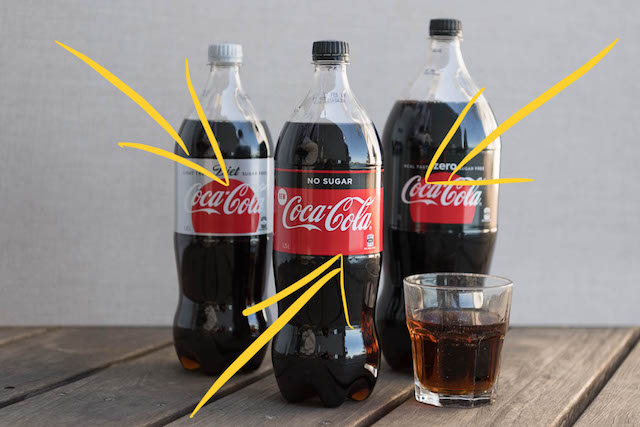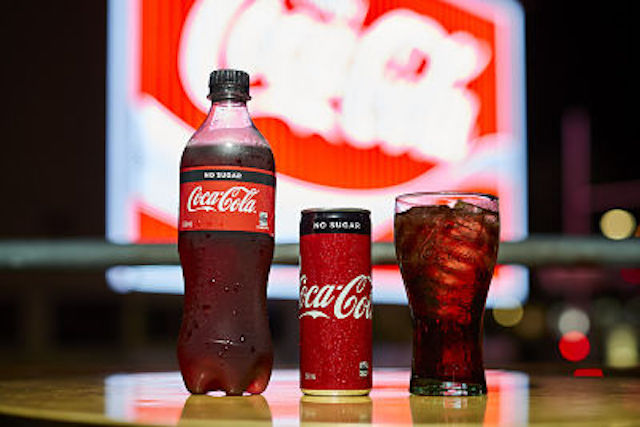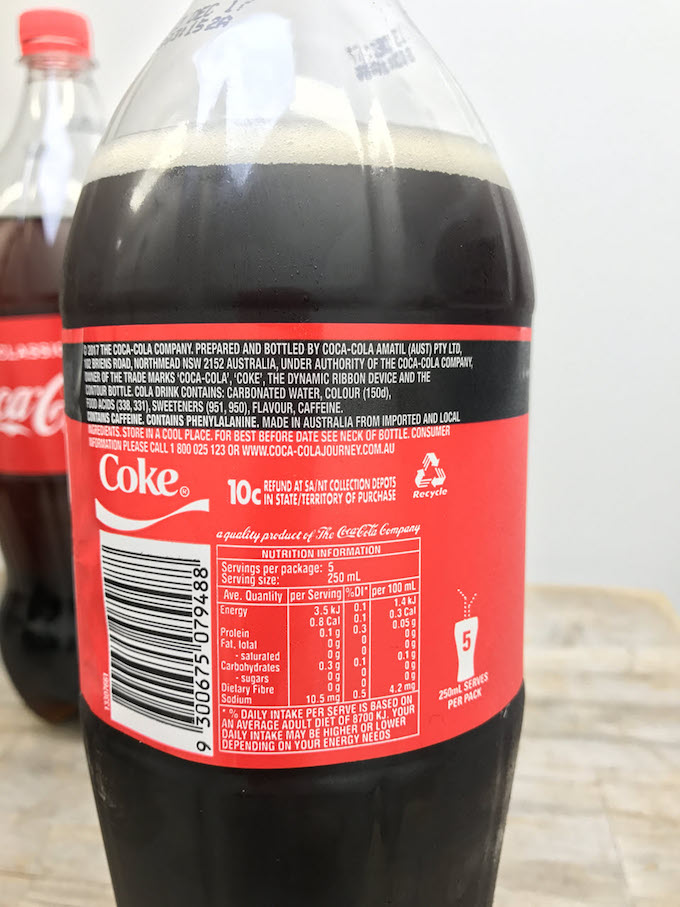Product Snapshot Coca Cola No Sugar

Really? Yet another sugar-free version of the famous multimillion dollar Coca Cola brand? This is attempt No 4 at a no-sugar variety – following Diet Coke, Coke Zero, and the sugar-reduced-but-still-sweetened, Coke Life.
So the multimillion dollar question is - why release another fizzy drink containing no sugar? What are the differences? Does this newest one really taste THAT much better? We did a blind mini taste-test of Zero, Diet and this new No Sugar to find out.
What is Coke No Sugar?
The company claims Coke No Sugar is their best tasting, sugar-free, Coke to date. It’s taken five years to develop the formula and get it just right. They claim No Sugar has a new and improved formula, but I took part in the blind test and couldn’t tell the difference.

Having said that, I’m not, and have never been, a big Coke drinker. So I called in three regular Coke-drinking friends to help tease out the differences that my untrained tastebuds could supposedly not detect.

- The regular Coke drinkers could taste the difference between regular and all the other non-sugar varieties. Interestingly, despite giving Zero the best result in the blind-tasting, they admitted they would not change to any of the lower-sugar varieties.
- The Coke Zero lovers could not tell the difference between Diet, Zero and No Sugar. They ranked Diet highest in the blind-tasting, despite having earlier claimed to hate the taste of Diet Coke!
- The Diet Coke Dedicateds remained loyal to the first no-sugar Coke and had resisted the temptation to swap to Zero when it was launched in 2006. On tasting, they ranked No Sugar the highest, with Diet a close second. When asked if they would swap to No Sugar, they declined, preferring what they were used to.
Pros
- Coca Cola No Sugar has no added sugar. Being liquid calories and easy to drink, this means it is ‘healthier’ for you, although many may disagree – see the Cons below.
- This has virtually no kilojoules or Calories. If you’re trying to shed weight or have diabetes, you can head out and have one in place of a beer, wine, or cocktail.
- Coca Cola No Sugar does not contain any preservatives. The older Cokes have sodium benzoate (211), which is needed once you omit the preserving properties of sugar.
Cons
- Sweeteners can have side effects even though they’ve been cleared by authorities like the US Food and Drug Administration (USFDA), European Food Safety Authority (EFSA) and Food Standards Australia New Zealand (FSANZ). In any case, they perpetuate a liking for a sweet taste which is not desirable.
- You’re still getting all the negatives of a cola drink – lots of phosphoric acid which erodes your tooth enamel as it’s so acidic, a processed food, caffeine, no nutrition.
- You’re buying into the whole CC marketing with its images of youth, fun and summer refreshment.
Are the ingredients different?
Hardly at all. Here are the ingredients in Coca Cola No Sugar:
| Carbonated Water, Colour (150d), Food Acids (338, 331), Sweeteners (951, 950), Flavour, Caffeine. Contains caffeine. Contains Phenylalanine. |
Here's what those additive code numbers mean:
Colour 150d
This is Caramel IV and is natural, not artificial, and a dark-brownish colour. It is the most widely used colouring in the world and is made by heating up carbohydrates or sugars in a process called caramelisation. For the past 40 years, all caramel safety studies have shown no health threat to humans and it meets rigorous food safety standards around the world.
Food acid 338
This is the famous phosphoric acid which is part of the iconic flavouring of Coke. It’s big downside is that it creates an acidic environment which sets the scene for dental erosion by bathing your teeth in an highly-acidic solution. Not good.
Food acid 331
Sodium citrate is a common food acid and is used in tomato juice and many fruit and veg products. Apart from its acidity, it’s not harmful.
Sweetener 951
Aspartame is a calorie-free sweetener.
Sweetener 950
Acesulphame potassium (or Ace-K) is another calorie-free sweetener.
Flavour
No-one knows what is in the flavour or flavours - which is the same as any other processed products. CC say this optimisation of the flavours is a key difference but who knows?
How does it differ from Diet Coke and Coke Zero?
Looking at the composition of the drinks, No Sugar and Diet contain only slight differences, but the ingredients of No Sugar and Zero are identical – except maybe the flavours which aren’t specified.
Coke No Sugar, Coke Zero and Diet Coke are all sweetened with aspartame and acesulphame potassium. These two are common sweeteners used in place of sugar to create foods with low kilojoules or no sugar.
Yes there’s been lots of angry internet sites and anti-sweetener sentiment but several rounds of investigation by the USFDA, the EFSA and by our FSANZ have failed to find enough evidence to get rid of them. So in the usual smallish quantities we consume, they’re not considered a huge health problem.
Having said that, there doesn’t seem to be great advantages to sweeteners for dieters so we don’t recommend them for weight loss.

The bottom line
Coke have claimed they’re phasing out Coke Zero in favour of this new No Sugar. Our testers couldn’t find any difference between the two varieties, so perhaps the change may not be particularly noticeable.
Of course, we here recommend everyday drinks like water or milk for children, but for the occasional fizzy drink or when you’re out, this No Sugar tastes much better than regular Coke, which is loaded with sugar and kilojoules/Calories.
Thank you to Caitlin Delaney, student dietitian, for organising the taste-test and background research. We wish to thank Julie, Patrick and Jasmine for taking part so nicely in the taste testing.




